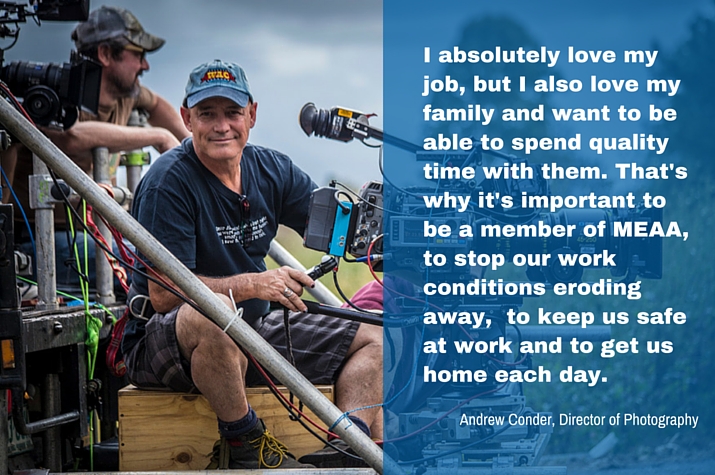Spotlight on Andrew Conder

Director of photography, Andrew Conder, got his start as a camera assistant at Channel Seven and spent the beginnings of his career travelling the globe filming wild animals and accessing seemingly unreachable places. We chat to Andrew after wrapping US feature film The Shallows and ready to start the ABC's Nowhere Boys next month.
What is your role?
My role on set is the director of photography, which involves being in charge of getting the directors vision onto the screen in a creative fashion that tells the story of the script.
Take us through a full day for you on set?
My day usually starts very early. I like to get to set before everyone else so I can go through my lighting plans and shot selections to make sure that they will still work out on the actual set as thought in pre-production.
The crew, the director and actors gather on set and we will usually “block” through the scene with the director and actors so everyone knows what we are trying to achieve. While the actors go back to makeup and wardrobe, we set about creating the lighting and setting the cameras and cranes, dollies etc. for the first shot.
I liaise with all departments to see what they require and if there is anything required from me to help them with their part of the shot. I also work with the department heads to make sure that we have things ready for all the upcoming shots. I need to be thinking about a lot of shots at once, not just the shot I’m working on at the time.
This goes on for around 10 to 16 hours every day until wrap is called then your homework starts for the next days’ work i.e. going over the dailies with the director, discussing the director’s requirements for the next day and making sure the production office is happy with the progress of the day.
When you are given a script, what are your first steps?
When I am given a script the first thing I do is read it twice. The first time I read it is to just get a feel for it, to see how captivated I am with the story (if it holds my attention). The second time I read it I am thinking more analytically about it, i.e. trying to think of ways to get the story onto the screen and trying to work out how I will make it fit into the budget I've been told we have.
After that, I’m in discussions with the director to understand his vision then a lot of research and breaking down each scene in detail.
How did you get your start in the industry?
I started my career after completing high school. I got a job as a camera assistant up at Channel 7 in Brisbane. I worked on shows such as “Wombat” and “Sportscene” shooting and editing magazine style stories and doing a lot of travel. I stayed at Channel 7 and worked my way up the cameraman / editor ladder, but after 10 years I really wanted to move on and be a part of those Hollywood blockbusters that I loved watching. I went freelance and started once again as a camera assistant working on movies and worked my way up the ladder again.
What are some of your career highlights?
I have so many career highlights! From gathering some of the most amazing footage of wild animals in Africa to being able to work in some of the most beautiful places in the world and getting access to where most people can't go. Not to mention some of the most awesome and influential people that I have met along the way and of course the crews that I get to call friends. There are individually too many highlights to list - I really have had a wonderful career.
What would be your advice for young people wanting to get into the industry?
My advice to young people is firstly - Join the union! The most important thing is to make sure you are passionate about this industry, it is not an easy business to be in and there will be a lot of slow times as well as a lot of long hard hours, sometimes you are struggling to find a dollar, the next week you could be making thousands. You have to be passionate and dedicated to your craft (and I mean REALLY dedicated). Also, keep researching the latest ideas and equipment so you are ready when you have to step up.